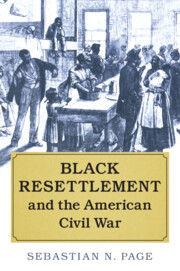Book contents
- Black Resettlement and the American Civil War
- Cambridge Studies on the American South
- Black Resettlement and the American Civil War
- Copyright page
- Dedication
- Contents
- Figures and Maps
- Acknowledgments
- Terminology
- Abbreviations
- Maps
- Introduction
- 1 The Revival of “Colonization,” to 1861
- 2 The Revival of “Emigration,” to 1862
- 3 The Republican Party and Resettlement, to 1863
- 4 Resettlement in Latin America, to 1864
- 5 Resettlement in the European West Indies, to 1865
- 6 Alternatives to Foreign Resettlement, to 1868
- Epilogue
- Index
4 - Resettlement in Latin America, to 1864
Published online by Cambridge University Press: 21 January 2021
- Black Resettlement and the American Civil War
- Cambridge Studies on the American South
- Black Resettlement and the American Civil War
- Copyright page
- Dedication
- Contents
- Figures and Maps
- Acknowledgments
- Terminology
- Abbreviations
- Maps
- Introduction
- 1 The Revival of “Colonization,” to 1861
- 2 The Revival of “Emigration,” to 1862
- 3 The Republican Party and Resettlement, to 1863
- 4 Resettlement in Latin America, to 1864
- 5 Resettlement in the European West Indies, to 1865
- 6 Alternatives to Foreign Resettlement, to 1868
- Epilogue
- Index
Summary
: The Republican colonizationists had always fixated on Latin America, especially Central America, where African American settlers might resist “filibusters,” expansionist expeditions supported by American citizens. For their part, the region’s rulers toyed with an influx of immigrants that would expand their population but darken its complexion. Once Abraham Lincoln came to power, he focused on the province of Chiriquí in what is now Panama (then part of Colombia), where black colonists might secure an isthmian crossing for US troops and traders. Announcing the venture in a notorious address of August 1862, the president had to retreat once he came to realize the instability of Colombian politics and the extent of his own associates’ stake in the business. Accordingly, the very same day that Lincoln issued the Emancipation Proclamation, he instead signed an agreement with a contractor to settle a party of freed slaves on the Île à Vache, one of Haiti’s satellite islands. That colony’s tragic failure finally impressed on him that he should not deal with sovereign states via shady contractors.
Keywords
- Type
- Chapter
- Information
- Black Resettlement and the American Civil War , pp. 143 - 188Publisher: Cambridge University PressPrint publication year: 2021

